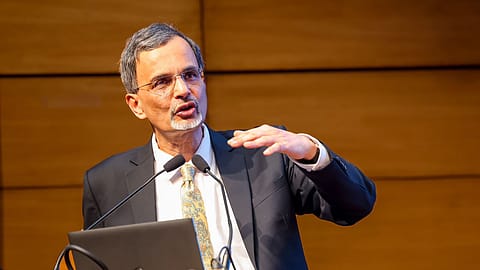Moving too quickly to non-fossil fuels could create economic instability for India: CEA
Chief Economic Adviser V Anantha Nageswaran says India must remain pragmatic and not turn global energy trends into a rigid doctrine.

Chief Economic Adviser (CEA) to the Government of India V. Anantha Nageswaran on Tuesday warned that moving too quickly toward non-fossil fuels could create economic instability for the country.
“For a country of this size, premature transition could lead to energy intermittency and spiraling capital costs. The opening of nuclear energy to private sector participation in this year’s Union Budget is a significant step forward. But as we embrace clean energy, we must remain pragmatic and not turn global energy trends into a rigid doctrine,” Nageswaran said at the Indian Venture and Alternate Capital Association (IVCA) Conclave 2025.
On the shifting global economic order, Nageswaran underscored the need for India’s private sector to prepare for changing trade and capital flow dynamics. “We have to be realistic that the trade and investment flows we saw in previous decades may not continue. A decade ago, low interest rates enabled capital flows, but now inflation is likely to be structurally higher. Energy security must remain a priority—we cannot sacrifice it in the name of energy transition,” he cautioned.
Speaking on deregulation as a driver of economic growth, Nageswaran emphasised that while the non-financial sector experienced major deregulation in 1991, India’s financial sector—given its size, middle-income status, and financial literacy levels—requires a more structured regulatory approach. “In the financial sector, there is always a tendency for regulation due to its multiplier effect. As 2008 showed, there are limits to self-regulation. While deregulation in India’s non-financial sector spurred growth, we must now focus on maximizing domestic financial growth, allowing enterprises and households to pursue economic opportunities without excessive compliance burdens. No developed country has achieved sustained growth without a vibrant small and medium enterprise sector,” he stated.
Discussing India’s investment climate, Nageswaran pointed to the strength of the country’s capital markets and its ability to generate sustained investor returns. “Despite the rupee depreciating at an average rate of 3% annually due to inflation differentials, India continues to deliver strong investment returns. The depth of our capital markets and exit opportunities remain robust, and that is what matters to investors,” he said. He also highlighted the government’s recognition of the impact investment sector, citing the $2.9 billion invested in 275 impact enterprises in 2023 and the policy support extended to private equity and venture capital in this year’s Union Budget.
When asked for a bold prediction about India’s economic future, Nageswaran asserted, “There is no other country growing consistently at 6.5-7% or more. India is in a demographic sweet spot that will last another 15-20 years. This is the country where, if you stay the course, you are rewarded. That is why investors should be a part of India's journey to Viksit Bharat by 2047.”